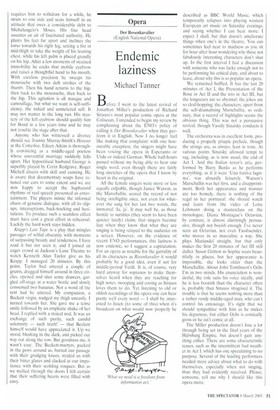Endemic laziness
Michael Tanner
Before I went to the latest revival of Jonathan Miller's production of Richard Strauss's most popular comic opera at the Coliseum. I intended to begin my review by complaining about the ENO's policy of calling it Der Rosenkavalier when they perform it in English. Now I no longer feel like making that complaint: with one honourable exception, the singers might have been voicing the opera in Esperanto or Urdu or indeed German. Whole half-hours passed without my being able to hear one single word, even though there are fairly long stretches of the opera that I know by heart in the original.
All the female singers were more or less equally culpable, though Janice Watson, as the Marschallin, scored the record of not being intelligible once, not even for whatever she sang for her last two words, the immortal 'Ia. ja'. It may well he, as those hostile to surtitles (they seem to have been quieter lately) claim, that singers become lazy when they know that what they are singing is being relayed to the audience on a screen. However, on the evidence of recent ENO performances, this laziness is now endemic, so I suggest a capitulation. For an opera as notable for the garrulity of all its characters as Rosenkavalier it would probably be a good idea, even if not for middle-period Verdi. It is, of course, very hard anyway for sopranos to make themselves heard when they are reaching for high notes. swooping and cooing as Strauss loves them to do. Yet listening to old or oldish recordings of the opera one can hear pretty well every word — I shall he interested to listen (to some of this) when it's broadcast on what would now properly be described as BBC World Music, which temporarily relapses into playing western European art music on Saturday evenings, and seeing whether I can hear more: I expect I shall. but that doesn't ameliorate things when one's in the theatre. You can sometimes feel near to madness as you sit for hour after hour wondering why these not fabulously interesting characters don't shut up. In the first interval I had a discussion with someone who was lucky enough not to be performing his critical duty, and about to leave, about why this is so popular an opera.
We remained baffled. It has the last 20 minutes of Act I, the Presentation of the Rose in Act II and the trio in Act III, but the longueurs are so abysmal; the jokes are so clod-hopping; the characters, apart from the self-dramatising Marschallin, so ordinary, that a record of highlights seems the obvious thing. This was not a persuasive revival, though Vassily Sinaisky conducts it well.
The orchestra was in excellent form, producing a properly priapic prelude, though the strings are, as always, lean in tone, At various points Sinaisky allowed tempi to sag, including, as is now usual, the end of Act I. And the Italian tenor's aria, performed by Barry Banks as he performs everything, as if it were 'Una furtiva lagrima', was absurdly leisurely. Watson's Marschallin was her first, and a disappointment. Both her appearance and manner are too homely, there is nothing of the regal in her portrayal: she should watch and learn from the video of Lotte Lehmann doing a masterclass on the monologue. Diana Montague's Octavian, by contrast, is almost alarmingly persuasive, though not boyish enough. I've never seen an Octavian, not even Fassbaender, who moves in so masculine a way. She plays Mariandel straight, but that only makes the first 20 minutes of Act III still duller. Susan Gritton as Sophie soars beautifully in places, but her appearance is impossible, she looks older than the Marschallin. About John Tomlinson's Ochs I'm in two minds. His enunciation is wonderful, the role suits his voice ideally, and he is less boorish than the character often is, probably than Strauss imagined it. The trouble is that he seems nothing more than a rather randy middle-aged man, who can't control his entourage. It's right that we should sympathise with him as he makes his departure, but either Ochs is comically gross or he isn't comic at all.
The Miller production doesn't lose a lot through being set in the final years of the Habsburg Empire, but doesn't gain anything either. There are some characteristic teases, such as the intermittent had weather in Act I, which has one speculating to no purpose. Several of the leading performers needed more advice about what to do with themselves, especially when not singing, than they had evidently received. Please, someone, tell me why I should like this opera more.


































































 Previous page
Previous page